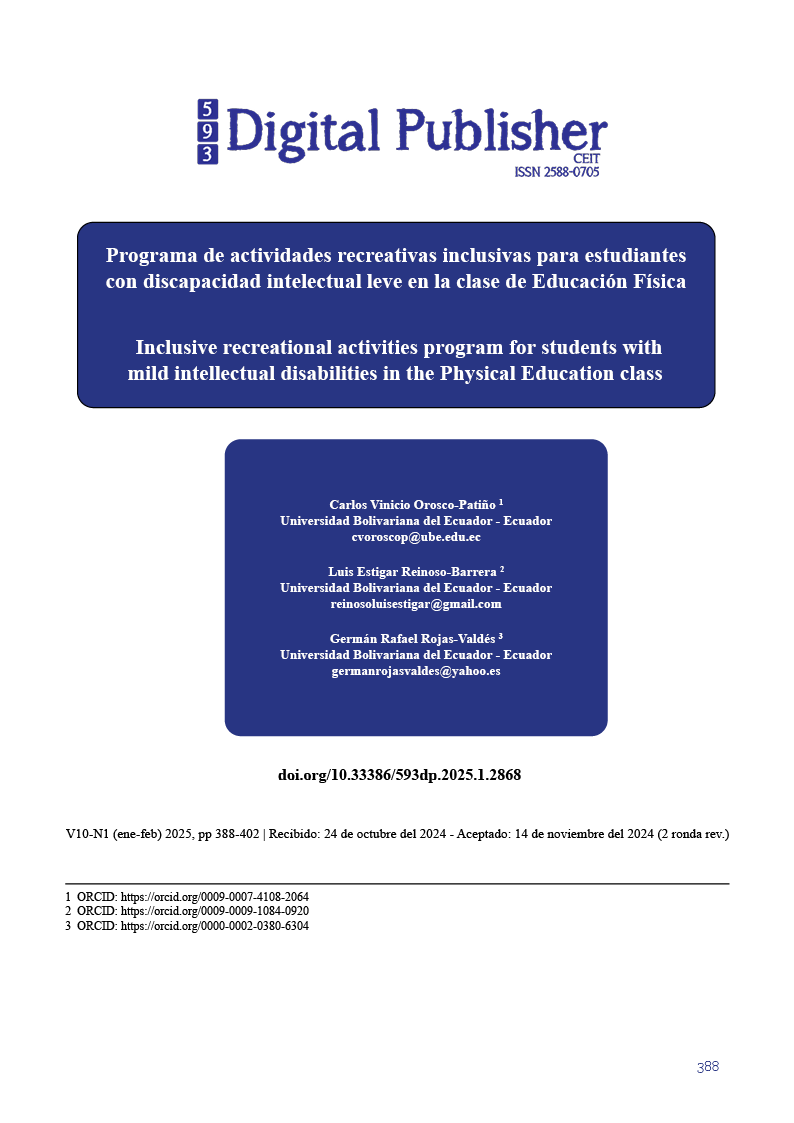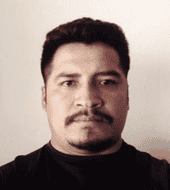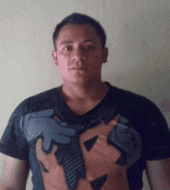Inclusive recreational activities program for students with mild intellectual disabilities in the Physical Education class
Main Article Content
Abstract
Students with mild intellectual disabilities face certain challenges in their learning, but with appropriate support and attention, they can achieve autonomy, including professional development. The aim of the present study was to design a recreational activities program to facilitate the inclusion of students in Physical Education classes, specifically for tenth grade at the Unidad Educativa Nabón, working with a population of 30 students from Parallel C. The research was conducted with a qualitative approach, being non-experimental and cross-sectional in nature. Various scientific methods were employed throughout the research process. The analysis and synthesis method allowed for theoretical grounding and justification of the researched problem, while the inductive-deductive method, along with the mathematical-statistical method, facilitated the consideration of the obtained results and validation of the proposed hypotheses. The results of the diagnosis revealed a growing dissatisfaction among students, mainly due to the limited variety of activities, which do not fully meet their needs and preferences. This limits the active participation of those with mild intellectual disabilities. In response, a program of recreational activities was proposed which, after being assessed by the results of the practical systematization and the interviews conducted with the students, they expressed a high degree of satisfaction with the proposed activities.
Downloads
Article Details

This work is licensed under a Creative Commons Attribution-NonCommercial-ShareAlike 4.0 International License.
1. Derechos de autor
Las obras que se publican en 593 Digital Publisher CEIT están sujetas a los siguientes términos:
1.1. 593 Digital Publisher CEIT, conserva los derechos patrimoniales (copyright) de las obras publicadas, favorece y permite la reutilización de las mismas bajo la licencia Licencia Creative Commons 4.0 de Reconocimiento-NoComercial-CompartirIgual 4.0, por lo cual se pueden copiar, usar, difundir, transmitir y exponer públicamente, siempre que:
1.1.a. Se cite la autoría y fuente original de su publicación (revista, editorial, URL).
1.1.b. No se usen para fines comerciales u onerosos.
1.1.c. Se mencione la existencia y especificaciones de esta licencia de uso.
References
Aguilera, J. Á. C. (2017). Un nuevo paradigma para un futuro más saludable y con valores. - Deporte Inclusivo, Actividad Física Inclusiva y Educación Física Inclusiva. Revista de Educación Inclusiva, 9(2), Article 2. https://revistaeducacioninclusiva.es/index.php/REI/article/view/51
Albán-Martinez, J., & Naranjo-Hidalgo, T. (2020). Inclusión educativa de estudiantes con discapacidad intelectual: Un reto pedagógico para la educación formal. 593 Digital Publisher CEIT, 4(5), 56-68. https://doi.org/10.33386/593dp.2020.4.217
Alonzo Indarte, D. C., & Aguilar Morocho, E. K. (2020). Estrategia metodológica inclusiva para niños con síndrome de asperger en las clases de educación física. Revista Cognosis. ISSN 2588-0578, 5(1), 19. https://doi.org/10.33936/cognosis.v5i1.2182
Barahona Rodríguez, A. P., & Reyes Plua, N. J. (2022). Los juegos cooperativos para la inclusión y fortalecimiento psicomotriz de los niños de 8 a 11 años con Síndrome de Down. http://repositorio.ug.edu.ec/handle/redug/65154
Brito, S., Basualto Porra, L., & Reyes Ochoa, L. (2019). Inclusión Social/Educativa, en Clave de Educación Superior. Revista Latinoamericana de Educación Inclusiva, 13(2), 157-172. https://doi.org/10.4067/S0718-73782019000200157
Castillero Mimenza. (2024). Tipos de discapacidad intelectual (y características). https://psicologiaymente.com/clinica/tipos-discapacidad-intelectual
Castillo Briceño, C. (2015). La educación inclusiva y lineamientos prospectivos de la formación docente: Una visión de futuro. Actualidades Investigativas en Educación, 15(2), Article 2. https://doi.org/10.15517/aie.v15i2.18534
Fais-Peña, C. J., Rodríguez-López, R. A., & Bennasar-García, M. I. (2023). Actividades lúdicas para mejorar la coordinación motriz en la educación primaria. Revista EDUCARE - UPEL-IPB - Segunda Nueva Etapa 2.0, 27(1), Article 1. https://doi.org/10.46498/reduipb.v27i1.1894
García, L. S., Anoceto, A. O. R., & Gonzalez, D. M. P. (2020). Programa de actividades de recreación física para adolescentes del municipio Encrucijada. Una necesidad insoslayable. Ciencia y Actividad Física, 7(1), 48-59. https://revistaciaf.uclv.edu.cu/index.php/revista/article/view/101
González-Martínez, F., González-Hernández, A., & Jesús-Esquivel, N. D. (2022). El juego como estrategia didáctica para favorecer el aprendizaje y la inclusión de los alumnos dentro del salón de clases. Revista RedCA, 5(13), Article 13. https://doi.org/10.36677/redca.v5i13.18692
Guachisaca, J. L. V., & Valdés, G. R. R. (2024). Juegos recreativos para la inclusión de estudiantes con discapacidad física, en las clases de Educación Física. PODIUM - Revista de Ciencia y Tecnología en la Cultura Física, 19(1), Article 1. https://podium.upr.edu.cu/index.php/podium/article/view/1583
Lucero-Lucero, C., Bravo-Quinteros, V., & Romero-Ibarra, O. (2023). El baile como medio para la inclusión educativa en niños con necesidades educativas especiales en las clases de educación física. 593 Digital Publisher CEIT, 8(6), 562-580. https://doi.org/10.33386/593dp.2023.6.2146
Parraga-Quijije, A. S., & Zambrano-Acosta, J. M. (2023). Actividades lúdicas para el desarrollo de la motricidad gruesa en niños de 3 años. MQRInvestigar, 7(1), Article 1. https://doi.org/10.56048/MQR20225.7.1.2023.2431-2451
Sánchez, D. C. J. L. M.-. (2017). El programa recreativo y su proyección formativa. Revista científica especializada en Ciencias de la Cultura Física y del Deporte, 14(34), 96-106. https://deporvida.uho.edu.cu/index.php/deporvida/article/view/757




